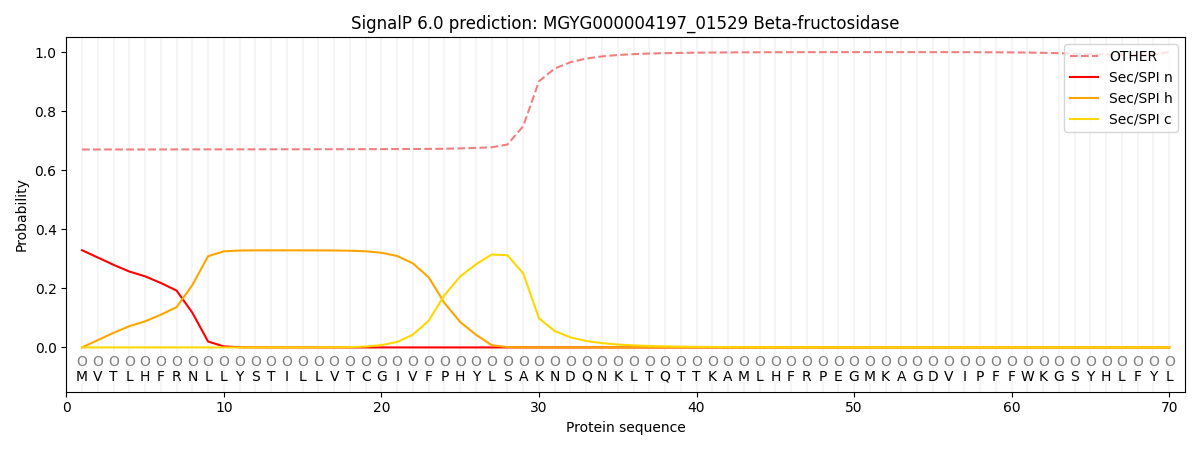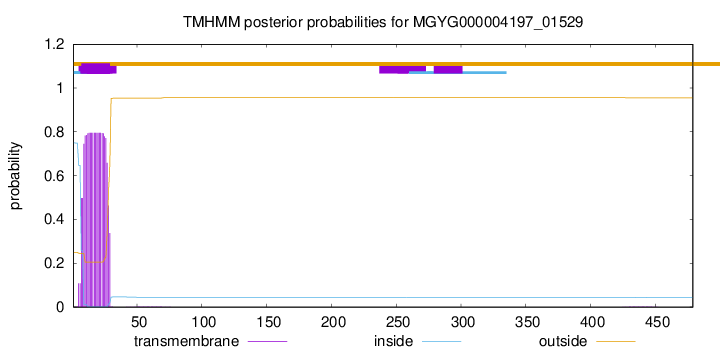You are browsing environment: HUMAN GUT
CAZyme Information: MGYG000004197_01529
You are here: Home > Sequence: MGYG000004197_01529
Basic Information |
Genomic context |
Full Sequence |
Enzyme annotations |
CAZy signature domains |
CDD domains |
CAZyme hits |
PDB hits |
Swiss-Prot hits |
SignalP and Lipop annotations |
TMHMM annotations
Basic Information help
| Species | ||||||||||||
|---|---|---|---|---|---|---|---|---|---|---|---|---|
| Lineage | Bacteria; Bacteroidota; Bacteroidia; Bacteroidales; Rikenellaceae; Alistipes_A; | |||||||||||
| CAZyme ID | MGYG000004197_01529 | |||||||||||
| CAZy Family | GH32 | |||||||||||
| CAZyme Description | Beta-fructosidase | |||||||||||
| CAZyme Property |
|
|||||||||||
| Genome Property |
|
|||||||||||
| Gene Location | Start: 12969; End: 14408 Strand: - | |||||||||||
CAZyme Signature Domains help
| Family | Start | End | Evalue | family coverage |
|---|---|---|---|---|
| GH32 | 45 | 335 | 4.4e-46 | 0.9965870307167235 |
CDD Domains download full data without filtering help
| Cdd ID | Domain | E-Value | qStart | qEnd | sStart | sEnd | Domain Description |
|---|---|---|---|---|---|---|---|
| cd08995 | GH32_EcAec43-like | 7.78e-83 | 54 | 331 | 1 | 281 | Glycosyl hydrolase family 32, such as the putative glycoside hydrolase Escherichia coli Aec43 (FosGH2). This glycosyl hydrolase family 32 (GH32) subgroup includes Escherichia coli strain BEN2908 putative glycoside hydrolase Aec43 (FosGH2). GH32 enzymes cleave sucrose into fructose and glucose via beta-fructofuranosidase activity, producing invert sugar that is a mixture of dextrorotatory D-glucose and levorotatory D-fructose, thus named invertase (EC 3.2.1.26). GH32 family also contains other fructofuranosidases such as inulinase (EC 3.2.1.7), exo-inulinase (EC 3.2.1.80), levanase (EC 3.2.1.65), and transfructosidases such sucrose:sucrose 1-fructosyltransferase (EC 2.4.1.99), fructan:fructan 1-fructosyltransferase (EC 2.4.1.100), sucrose:fructan 6-fructosyltransferase (EC 2.4.1.10), fructan:fructan 6G-fructosyltransferase (EC 2.4.1.243) and levan fructosyltransferases (EC 2.4.1.-). These retaining enzymes (i.e. they retain the configuration at anomeric carbon atom of the substrate) catalyze hydrolysis in two steps involving a covalent glycosyl enzyme intermediate: an aspartate located close to the N-terminus acts as the catalytic nucleophile and a glutamate acts as the general acid/base; a conserved aspartate residue in the Arg-Asp-Pro (RDP) motif stabilizes the transition state. These enzymes are predicted to display a 5-fold beta-propeller fold as found for GH43 and CH68. The breakdown of sucrose is widely used as a carbon or energy source by bacteria, fungi, and plants. Invertase is used commercially in the confectionery industry, since fructose has a sweeter taste than sucrose and a lower tendency to crystallize. |
| smart00640 | Glyco_32 | 2.16e-48 | 58 | 443 | 15 | 436 | Glycosyl hydrolases family 32. |
| COG1621 | SacC | 6.79e-48 | 29 | 471 | 12 | 478 | Sucrose-6-phosphate hydrolase SacC, GH32 family [Carbohydrate transport and metabolism]. |
| cd08996 | GH32_FFase | 2.03e-45 | 58 | 324 | 9 | 280 | Glycosyl hydrolase family 32, beta-fructosidases. Glycosyl hydrolase family GH32 cleaves sucrose into fructose and glucose via beta-fructofuranosidase activity, producing invert sugar that is a mixture of dextrorotatory D-glucose and levorotatory D-fructose, thus named invertase (EC 3.2.1.26). This family also contains other fructofuranosidases such as inulinase (EC 3.2.1.7), exo-inulinase (EC 3.2.1.80), levanase (EC 3.2.1.65), and transfructosidases such sucrose:sucrose 1-fructosyltransferase (EC 2.4.1.99), fructan:fructan 1-fructosyltransferase (EC 2.4.1.100), sucrose:fructan 6-fructosyltransferase (EC 2.4.1.10), fructan:fructan 6G-fructosyltransferase (EC 2.4.1.243) and levan fructosyltransferases (EC 2.4.1.-). These retaining enzymes (i.e. they retain the configuration at anomeric carbon atom of the substrate) catalyze hydrolysis in two steps involving a covalent glycosyl enzyme intermediate: an aspartate located close to the N-terminus acts as the catalytic nucleophile and a glutamate acts as the general acid/base; a conserved aspartate residue in the Arg-Asp-Pro (RDP) motif stabilizes the transition state. These enzymes are predicted to display a 5-fold beta-propeller fold as found for GH43 and CH68. The breakdown of sucrose is widely used as a carbon or energy source by bacteria, fungi, and plants. Invertase is used commercially in the confectionery industry, since fructose has a sweeter taste than sucrose and a lower tendency to crystallize. A common structural feature of all these enzymes is a 5-bladed beta-propeller domain, similar to GH43, that contains the catalytic acid and catalytic base. A long V-shaped groove, partially enclosed at one end, forms a single extended substrate-binding surface across the face of the propeller. |
| cd18609 | GH32-like | 5.16e-41 | 46 | 251 | 2 | 217 | Glycosyl hydrolase family 32 family protein. The GH32 family contains glycosyl hydrolase family GH32 proteins that cleave sucrose into fructose and glucose via beta-fructofuranosidase activity, producing invert sugar that is a mixture of dextrorotatory D-glucose and levorotatory D-fructose, thus named invertase (EC 3.2.1.26). This family also contains other fructofuranosidases such as inulinase (EC 3.2.1.7), exo-inulinase (EC 3.2.1.80), levanase (EC 3.2.1.65), and transfructosidases such sucrose:sucrose 1-fructosyltransferase (EC 2.4.1.99), fructan:fructan 1-fructosyltransferase (EC 2.4.1.100), sucrose:fructan 6-fructosyltransferase (EC 2.4.1.10), fructan:fructan 6G-fructosyltransferase (EC 2.4.1.243) and levan fructosyltransferases (EC 2.4.1.-). These retaining enzymes (i.e. they retain the configuration at anomeric carbon atom of the substrate) catalyze hydrolysis in two steps involving a covalent glycosyl enzyme intermediate: an aspartate located close to the N-terminus acts as the catalytic nucleophile and a glutamate acts as the general acid/base; a conserved aspartate residue in the Arg-Asp-Pro (RDP) motif stabilizes the transition state. These enzymes are predicted to display a 5-fold beta-propeller fold as found for GH43 and CH68. The breakdown of sucrose is widely used as a carbon or energy source by bacteria, fungi, and plants. Invertase is used commercially in the confectionery industry, since fructose has a sweeter taste than sucrose and a lower tendency to crystallize. A common structural feature of all these enzymes is a 5-bladed beta-propeller domain, similar to GH43, that contains the catalytic acid and catalytic base. A long V-shaped groove, partially enclosed at one end, forms a single extended substrate-binding surface across the face of the propeller. |
CAZyme Hits help
| Hit ID | E-Value | Query Start | Query End | Hit Start | Hit End |
|---|---|---|---|---|---|
| QGA24007.1 | 2.70e-251 | 37 | 476 | 37 | 476 |
| QEH34807.1 | 1.51e-79 | 44 | 477 | 258 | 706 |
| CDR30223.1 | 3.13e-45 | 2 | 475 | 8 | 497 |
| BCG57106.1 | 1.61e-41 | 44 | 458 | 4 | 465 |
| QWU16740.1 | 3.13e-41 | 44 | 458 | 4 | 465 |
PDB Hits download full data without filtering help
| Hit ID | E-Value | Query Start | Query End | Hit Start | Hit End | Description |
|---|---|---|---|---|---|---|
| 7VCO_A | 2.55e-30 | 60 | 461 | 46 | 467 | ChainA, Sucrose-6-phosphate hydrolase [Frischella perrara],7VCP_A Chain A, Sucrose-6-phosphate hydrolase [Frischella perrara] |
| 1W2T_A | 3.44e-28 | 60 | 478 | 23 | 430 | beta-fructosidasefrom Thermotoga maritima in complex with raffinose [Thermotoga maritima MSB8],1W2T_B beta-fructosidase from Thermotoga maritima in complex with raffinose [Thermotoga maritima MSB8],1W2T_C beta-fructosidase from Thermotoga maritima in complex with raffinose [Thermotoga maritima MSB8],1W2T_D beta-fructosidase from Thermotoga maritima in complex with raffinose [Thermotoga maritima MSB8],1W2T_E beta-fructosidase from Thermotoga maritima in complex with raffinose [Thermotoga maritima MSB8],1W2T_F beta-fructosidase from Thermotoga maritima in complex with raffinose [Thermotoga maritima MSB8] |
| 1UYP_A | 1.18e-27 | 60 | 478 | 23 | 430 | Thethree-dimensional structure of beta-fructosidase (invertase) from Thermotoga maritima [Thermotoga maritima MSB8],1UYP_B The three-dimensional structure of beta-fructosidase (invertase) from Thermotoga maritima [Thermotoga maritima MSB8],1UYP_C The three-dimensional structure of beta-fructosidase (invertase) from Thermotoga maritima [Thermotoga maritima MSB8],1UYP_D The three-dimensional structure of beta-fructosidase (invertase) from Thermotoga maritima [Thermotoga maritima MSB8],1UYP_E The three-dimensional structure of beta-fructosidase (invertase) from Thermotoga maritima [Thermotoga maritima MSB8],1UYP_F The three-dimensional structure of beta-fructosidase (invertase) from Thermotoga maritima [Thermotoga maritima MSB8] |
| 6NUM_A | 7.28e-20 | 60 | 346 | 60 | 366 | Thestructure of GH32 from Bifidobacteium adolescentis [Bifidobacterium adolescentis],6NUN_A Structure of GH32 hydrolase from Bifidobacterium adolescentis in complex with frutose [Bifidobacterium adolescentis] |
| 3PIG_A | 2.37e-17 | 60 | 356 | 60 | 375 | beta-fructofuranosidasefrom Bifidobacterium longum [Bifidobacterium longum],3PIG_B beta-fructofuranosidase from Bifidobacterium longum [Bifidobacterium longum],3PIJ_A beta-fructofuranosidase from Bifidobacterium longum - complex with fructose [Bifidobacterium longum],3PIJ_B beta-fructofuranosidase from Bifidobacterium longum - complex with fructose [Bifidobacterium longum] |
Swiss-Prot Hits download full data without filtering help
| Hit ID | E-Value | Query Start | Query End | Hit Start | Hit End | Description |
|---|---|---|---|---|---|---|
| O33833 | 2.57e-27 | 60 | 478 | 23 | 430 | Beta-fructosidase OS=Thermotoga maritima (strain ATCC 43589 / DSM 3109 / JCM 10099 / NBRC 100826 / MSB8) OX=243274 GN=bfrA PE=1 SV=1 |
| P40714 | 6.44e-23 | 45 | 452 | 29 | 449 | Sucrose-6-phosphate hydrolase OS=Escherichia coli OX=562 GN=cscA PE=3 SV=1 |
| P49174 | 3.56e-22 | 45 | 342 | 58 | 384 | Beta-fructofuranosidase, cell wall isozyme OS=Zea mays OX=4577 PE=2 SV=1 |
| Q8W4S6 | 1.34e-21 | 32 | 356 | 6 | 356 | Beta-fructofuranosidase, insoluble isoenzyme CWINV6 OS=Arabidopsis thaliana OX=3702 GN=CWINV6 PE=2 SV=1 |
| P16553 | 7.32e-21 | 60 | 456 | 44 | 452 | Raffinose invertase OS=Escherichia coli OX=562 GN=rafD PE=3 SV=1 |
SignalP and Lipop Annotations help
This protein is predicted as OTHER

| Other | SP_Sec_SPI | LIPO_Sec_SPII | TAT_Tat_SPI | TATLIP_Sec_SPII | PILIN_Sec_SPIII |
|---|---|---|---|---|---|
| 0.683142 | 0.313058 | 0.001305 | 0.000732 | 0.000615 | 0.001144 |

